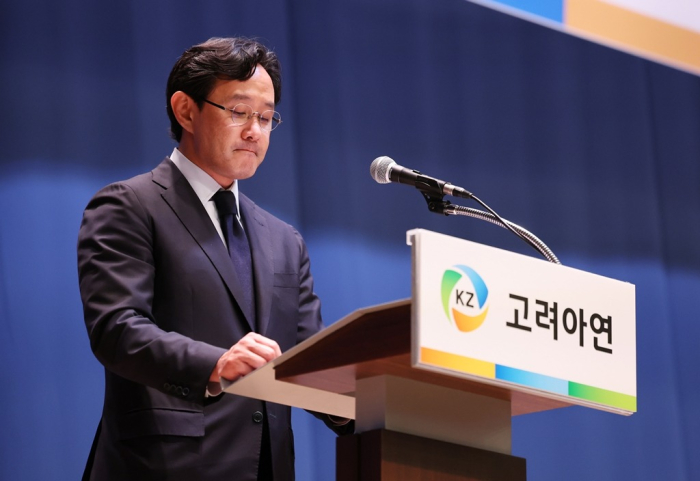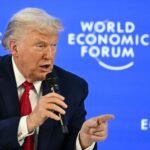
Korea Zinc Inc., the world’s top lead and zinc smelter, on Wednesday withdrew its 2.5 trillion won ($1.8 billion) rights issue as the measure to secure more shares in a battle with MBK Partners Ltd., which is closer to winning, sparked protests from and shareholders and prompted a regulator to launch a probe.
“The board of directors has determined that the most reasonable step is to protect shareholders, stabilize the market and restore shareholder confidence by addressing shareholder concerns and responding to as many requests as possible in a humble manner,” Korea Zinc Chair Choi Yun-birm told reporters.
After the decision, the company’s share tumbled 14.1% to close at 981,000 won, far underperforming a 2.64% loss in the benchmark Kospi.
North Asia-focused private equity firm MBK and Young Poong Corp. currently have a 39.83% stake in Korea Zinc. as they increased their holdings through purchases in the stock market.
Choi and his allies are estimated to secure 35.33%, on the other hand. Korea Investment & Securities Co. and Hankook Precision Works Co., a subsidiary of Hankook Tire & Technology Co., which were his white knights with stakes of 0.8% and 0.7%, respectively, sold all of their shares.
CONTROVERSIAL RIGHTS ISSUE
Korea Zinc on Oct. 30 said it will raise 2.5 trillion won in rights issues in December following its share buybacks and allocate 20% of them to its employees, a move aimed at repaying debts used for its recent share buybacks in a battle against a takeover bid by MBK and the smelter’s top shareholder Young Poong.
Korea Zinc had planned to issue 3,732,650 shares at 670,000 won each, or 25% below its buyback price of 890,000 won. The new shares will represent 20% of its outstanding shares, excluding treasury stocks that it bought back at 1.8 trillion won this month for cancellation.
The rights issue had been expected to allow Choi and his allies, who have a smaller stake than the MBK coalition, to secure a stake of up to 4%.
The plan pushed down its share price by the daily limit of 30% on the day, however.
Investors criticized Korea Zinc for borrowing money to keep its management control and making shareholders repay the debt.
South Korea’s Financial Supervisory Service (FSS) has put the brakes on the plan, saying the regulator found fault with the rights offering process, which appeared to start during Korea Zinc’s Oct. 4-23 share buyback tender offer period and questioned the rationale behind the new share issue.
The FSS plans to continue its investigation although Korea Zinc dropped the offering plan.
“We will separately investigate accounting supervision and unfair trading issues regardless of the company’s cancellation of the rights issue,” said an FSS official. “We are also probing issues raised by both Korea Zinc and Young Poong.”
Korea Zinc said on Wednesday that the offering aimed at increasing trading volumes, adding the company had not anticipated the regulatory move and shareholder concerns before the rights issue plan.

TO REGAIN SHAREHOLDER SUPPORT
Choi has been scrambling to maintain the existing allies on his side and secure more stakes. He was known to explain Korea Zinc’s long-term strategies to major shareholders such as South Korea’s National Pension Service (NPS) with a 7.83% stake as of end-June, saying the current management is the best for the smelter.
He needs to persuade Hyundai Motor Group with a 5.05% stake, which has yet to express its stance in the management feud, to support the current management.
Choi on Wednesday pledged to step down as chairman of the board while promising other measures for shareholder value to regain investor confidence by boosting shareholder value.
“I will step down as chairman of the board of directors as soon as possible to allow an outside director to chair the board and strengthen the board’s independence.”
MAJORITY OF THE MINORITY VOTES
He said the company is considering revising its articles of incorporation to appoint a director for minor shareholders through a majority of the minority voting system.

The system allows a company to make a decision with the consent of smaller shareholders in certain cases excluding the voting rights of the largest shareholder.
Choi may have considered the system to use when he loses votes against the MBK coalition, as few South Korean companies adopted it, industry sources said.
Choi may not be able to seek the system as any revision of Korea Zinc’s article of association needs approval from more than two-thirds of shareholders including MBK and Young Poong present at a shareholders’ meeting, the sources added.
By Hyung-Kyu Kim, Woo-Sub Kim and Sang Hoon Sung
khk@hankyung.com
Jongwoo Cheon edited this article.














